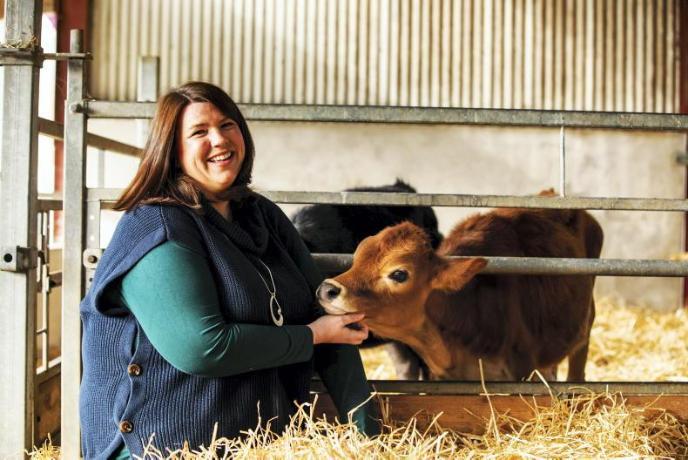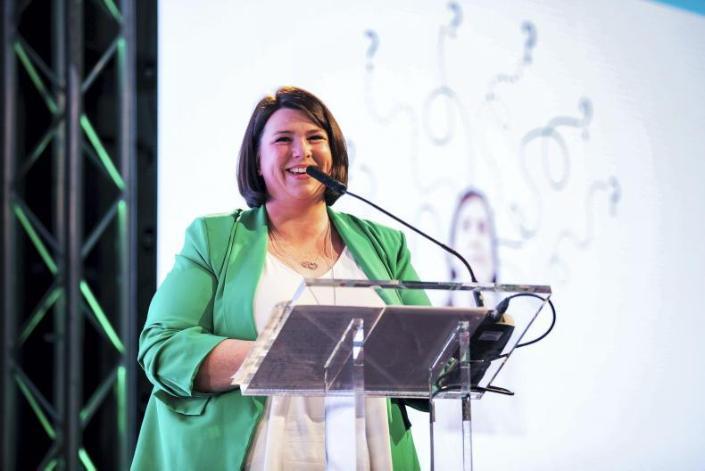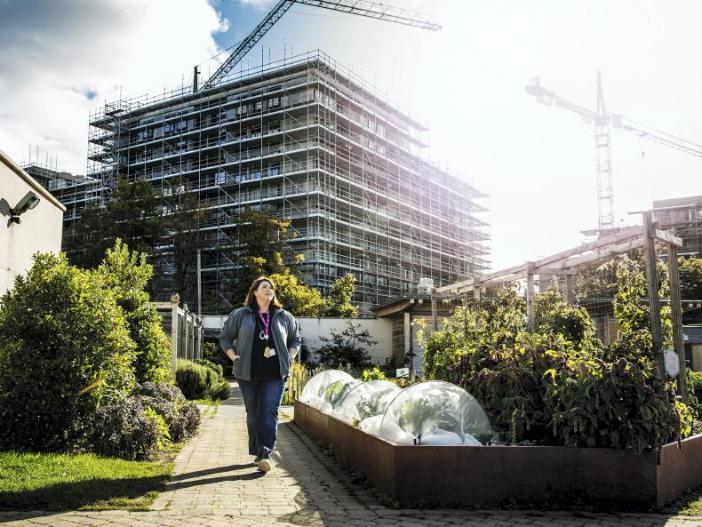Dr. Kirstie McAdoo - from pupil to teacher; her love for education in the agri-food industry
News
- AgriFood Matters Podcast Series
- Recent News 2022
- Recent News 2023
- Recent News 2024
- Dr Helen Sheridan appointed to the Teagasc Authority
- BSc Sustainable Food Systems
- Exciting PhD Opportunity
- Graduate Spotlight: Richard Shakespeare
- Graduate Spotlight: Seán Molloy
- Coillte Launches New Foresty Scholarship Programme
- My Uni Life returns to RTE featuring UCD students & Lyons Farm
- University College Dublin researchers recruiting horses for Equine Headshaking Syndrome research.
- Farming Minds Project
- One Health: UCD launches pioneering new centre for better health of people and the planet
- UCD Agriculture, Food Science & Human Nutrition Careers Day 2024
- Farm Walk and Talk Returns to Lyons Farm
- UCD Teagasc Knowledge Transfer Funded Masters 2024
- UCD SAFS celebrates St.Patricks Day in China
- Crillo Cattle - Could heat resistant cattle be the industry's answer to climate change?
- Emerging Greentech Start-Up Wins UCD’s 2024 VentureLaunch Accelerator Programme
- UCD Summer Schools 2024
- UCD School of Agriculture & Food Science Graduate Taught Webinar Series
- A number of exciting PhD Opportunities Available
- Our Rural Future: Minister Humphreys launches first ever bursary to support Masters Students in field of rural development
- New collaborative research centre to transform food system launches at UCD
- PWE - Why it's one of the best thing about studying Ag & Food Science
- ‘We need a one-cycle agri-food system,’ says FAO Director General
- Aoife Feeney - Studying at UCD through DARE
- Beef-Quest Research Project aims to Reduce Age of Cattle Finishing
- UCD School of Agriculture & Food Science Celebrates it's new Class of 2024
- Adaptive predator management to promote breeding wader conservation
- GDIC Conferring Ceremony 2024
- The launch of the new FBD UCD agricultural research and education centre takes place at UCD.
- Teagasc PhD Walsh Scholarship Opportunity
- EU Commissioner Mairéad McGuinness awarded UCD Honorary Degree
- UCD Goes Ploughing 2024
- UCD gradaute, Christopher Cahill wins FBD Young Farmer of the Year
- Two UCD Alumni are awarded Nuffield Scholarships for 2025
- ASA Travel Bursary student Shane O'Brien tells his PWE tales from abroad
- Donal O'Neill from UCD Food & Agribusiness Management to Managing Sales at Camida
- UCD agri graduate Stephen Robb named latest member of RTE’s Ear to the Ground
- Agricultural knowledge exchange in a changing world
- “Sometimes it’s the journey that teaches you a lot about your destination.”
- UCD Horticulture launches new Plant Health training programme
- School Awards Ceremony 2024
- Dr. Kirstie McAdoo - from pupil to teacher; her love for education in the agri-food industry
- Recent News 2025
Passionate about all things sustainable, food and farming, Kirstie has spent her life working with young people, women and the public to increase awareness and understanding of our food production systems from the soil up. She has worked with the Dept of Education, Dept. of Agriculture, UCD and many international universities and organisations in novel and exciting research around everything from new post-primary science and Ag. Science curricula, to the effects of diet on methane production in beef, to the trustworthiness of big Agri-data, soil and crop adaptations to climate change.
We spoke to Kirstie about her career journey and this love for food and farming; how it has developed over the years into such a wonderful career enabling her to give back to the community and education.

What led you to study Agriculture?
I am from a completely non-agricultural back ground growing up in the south Dublin suburb of Dundrum. However, I was lucky enough to go to a school that had Ag. Science as a subject for the Leaving Cert. I did it because I loved animals and the outdoors and I fell in love with the processes and intricacies of food production and luckily UCD was just down the road from me so it as an easy choice to go and study Animal Science.
I was lucky enough to go to a school that had Ag. Science as a subject for the Leaving Cert...and I fell in love with the processes and intricacies of food production
What is your fondest memory from your time at UCD?
My fellow classmates and the experiences we had in the Ag. Building. I made lifelong friends from across Ireland and we got to really know each other because of the smaller class sizes and speciality classes we attended. The other standout was of course the opportunity to send 3 months in New Zealand as part of my professional work experience in 3 rd year. It was not just amazing to travel, but also to experience agriculture in a different country and gain insight into their production practices.
Have you always been interested in this career area?
Since 6 th year I always thought I would end up in Agriculture. Although breaking into the industry is tricky, the expertise I gained from my undergrad in UCD and then from my PhD has led me into areas of education and research that I never even dreamed of.
Sustainability wasn’t really an issue when I was in college, and yet my own research and subsequent opportunities have meant that now I get to lecture Human Nutrition and Dietetic students on Sustainable Food systems and why they are critical to their education too.
How did your studies at UCD support or encourage that interest?
I had a huge number of opportunities as a result of UCD. Not just the education but also the network of contacts built over the years across. The opportunities available both inside and outside the classroom, the UCD Farm and international work experience give a great starting pad for students. The innovation centres and focus on sustainability now available are also a unique opportunity for students to come out with the best qualifications.
A PhD is a phenomenal achievement; what would you say to students considering further study or those looking to return to education?
For me, the PhD was, as expected a huge amount of work with parts I liked, parts I loved and parts I struggles with. It was an amazing experience to work with animals in research, especially on a topic that was so relevant then and now (Methane reduction in Beef Cattle through Nutritional means). I would say to students thinking of going into a PhD to really make sure they are passionate about the topic they are researching because it will be their life for the next 4 years. Talk to the supervisors and other students in the field to get a feel for the work and where you will be working and treat it as a job, meaning that you give it your all but it is not your everything and remember to make the most of the opportunities it will give you. For example, conferences, travel, being on the cutting edge of industry and research, meeting people who are top of their field etc. It gives you so many soft skills around self-organisation, motivation, research and how to interpret data and information and these are essential skills you will use every day in your professional life.
A PhD also gives you so many soft skills around self-organisation, motivation, research and how to interpret data and information and these are essential skills you will use every day in your professional life.
What have been the most challenging aspects of your career?
Being a female in Agriculture, especially one that does not come from a farming background has been the most impactful on my career. It meant that I had to work harder to prove myself and that my opinion and voice mattered. This is changing now though and it is less of a barrier (but is still there!). However, by jumping at all opportunities and getting out there in the commercial world, I have seen it impact less and old fashioned opinions change. I would say though that women should seek out and build up other women as much as possible and promote them in any and all forum we find ourselves in. Ask why there are no, or few women on the board, or in the promo photos and don’t take no for an answer.

What is the proudest moment of your career to date?
I think there are several proud moments and in retrospect it’s that I built on each one that makes me proudest. Doing well in the Leaving cert, and in my undergraduate, making many great friends in college, gaining my PhD, helping to write the new JC Science specification and LC AG science Specification, being on the Women in Agriculture Action Group, being Chairman of some charity Boards, all are great moments, but none would have happened unless the work before had been done.
I am incredibly proud of having helped almost 20 women gain their degrees, masters and PhDs through work experience or supervision, and I’m incredibly proud of being accepted as an Adjunct Associate Professor in UCD as a recognition of my hard work and what I can offer Students from a practical standpoint. Having Airfield, a small, urban farm in the Dublin suburbs be a critical part of three international EU funded research projects in Big Agri data, crop adaptation and soil science due to building its reputation as a research organisation that works with the public was also pretty amazing and something that I never thought I would achieve.

Having recently taken time out from the role of Director of Education and Research in Airfield, can you give us some insight into what you would like to achieve during your career break?
I thought I would take some time off to be with my boys and to assess what I wanted to do and achieve in the next half of my career, but busy people stay busy! So I’m currently Chairing 2 Charitable Boards, working on the new LC Ag. Science Curriculum with the NCCA, Helping on the Women in Ag Action group with the Dept of Ag., Doing some freelance consultancy, a little bit of lecturing and also teaching LC Biology in a local school! The break has really helped me look at my values and where I place importance in my work life as well as establishing a better work life balance. Legacy is my biggest driver though, what impact and what changes will my being here make on the planet and people. I reckon if I spend the next 25 years working on that I will retire happy!
In your career and/or personal life, who have been the most inspiring or helpful mentors/advisors that you’ve had to date?
There’s been so many. My parents supported me in Ag, despite having no background in it, my husband has been a rock and has enabled me to do so much through the silent support of looking after the kids and keeping the house running when I couldn’t – we’re a team and that’s everything. But you learn a little from every person you work with. Some teach you good things about yourself and others and some don’t, its what you take away and store in yourself that matters. It took me a long time to realise that overworking doesn’t mean overachieving. But I had a boss a few years ago who taught me a lot about how to care for and work with a team. To look beyond the office and understand what makes them tick and if you know what drives them, then you can build them up, which builds the work ethic of the team and ultimately creates a little bit of magic.
What do you do to relax? Tell us a bit about your current life, family and hobbies.
I have a 5 and an 8 year old so relax is a relative term! But I do carve out a bit of time for myself outside of family and work which over the last 6 months has been critical. I have the paper delivered on a Saturday morning and read it in the car with a coffee as I wait for my sons hockey practice to be over. Going to church on Sundays and being in that community has recentred my spiritual wellbeing too, and reading in the evenings has given me head space instead of the doom scrolling on the phone. I’m aiming to read at least 50 books for pleasure this year. Giving back to Charities by being on their boards has been really fulfilling too and definitely fills my legacy bucket! I work with Farmer Time, Irish Seed Savers, Business for Biodiversity, Team Hope and Blackrock Education Centre, lending them expertise and insight when I can, but also paying into organisations that are doing trojan work to build up education, agriculture and nature with little to no governmental support.
What is the best piece of advice you’ve ever been given?
That perfect isn’t necessary to achieve greatness, that sometimes 80% is enough and will allow you to succeed whilst also being kind to yourself. It sounds obvious but because I spent most of my early career trying to establish myself, prove I was great at what I did and always gave more than anyone else, I forgot that I should also enjoy it. I think the second piece of advice that means the most to me is also the simplest. Be kind and invest in people. Think of what your fingerprint has left on them. The people you interact with will remember you and invest in you if you take the time to listen to them and get to know them. For me this has meant that, for example, 12 years after meeting someone they pick up the phone to you because they think you will be great at this job or that one and look to you for advice. And that, for me, is awesome.
There are so many opportunities for Ag. Graduates both within the field and out of it as the skill set you gain in UCD is really unparalleled.
Feeding The Future...
And finally what advice would you give to someone considering studying Agriculture and food science or a career in the agri food industry?
Do it. Ireland is a place and people intrinsically linked to the land, and whether you come from an Ag background or not, this industry needs you and your insight to help continue to build us as a country that is at the forefront of Agricultural ingenuity and research. There are so many opportunities for Ag. Graduates both within the field and out of it as the skill set you gain in UCD is really unparalleled. When I look back at my undergraduate class I now see journalists, veterinarians, researchers, teachers, traders, and industry experts across livestock, sustainability, equine, marketing, advertising and banking. No other degree can give you those opportunities! The Agri-Food Industry in Ireland, for us being a small rocky outcrop on the west of Europe, is pulling well above its weight and offers graduates an opportunity to flex their unique skills in a huge range of areas. For all the twists and turns my own career and life has had I wouldn’t move away from this industry if I was given the choice. There’s so much work already done, but there is so much more to do and it is such an exciting time to do it.